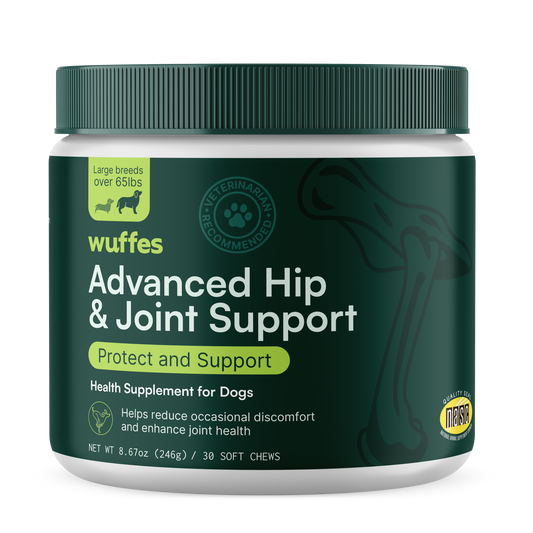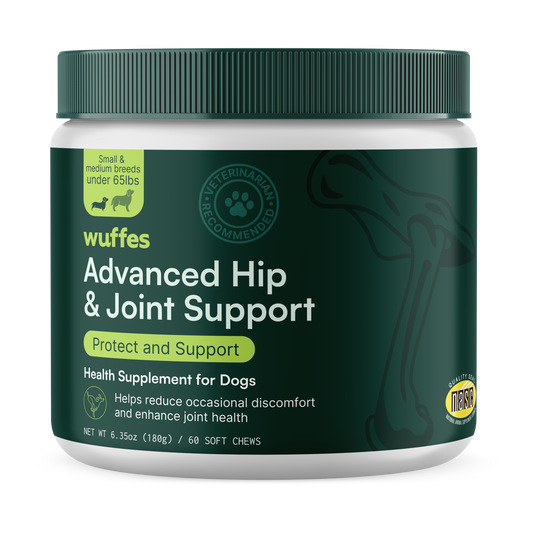Many common joint problems in dogs are influenced by a dog’s breed, due to genetics and skeletal conformation. Below, some of the most at-risk dog breeds for common joint problems are listed, though many other breeds are also at risk. If your dog’s breed is at an increased risk for joint issues, it is important to take a proactive approach from an early age to support their joint health. Supporting your dog with certain nutrients to optimize joint health, as well as the right caloric intake and exercise plan, can help maintain their joint comfort and overall mobility.
Common breed-associated joint problems
Hip & Elbow Dysplasia
Joint dysplasia is a developmental abnormality of the joint, which commonly affects the hips and elbows in dogs. This leads to abnormal forces placed on the cartilage and/or joint laxity, and ultimately osteoarthritis progression.[1][2]
Most at-risk breeds[1]:
- Both hip and elbow dysplasia: Chow Chow, Newfoundland, Rottweiler, American Staffordshire Terrier, German Shepherd, Mastiff, Bloodhound, Gordon Setter
- Hip dysplasia: Retrievers (especially Chesapeake Bay and Golden), Old English Sheepdog, Giant Schnauzer, Pembroke Welsh Corgi
- Elbow dysplasia: Bernese Mountain Dog, Shar Pei, Irish Water Spaniel, English Setter, English Springer Spaniel
Vertebral dysplasia (the neck and back)
The bones of the back (vertebrae) articulate with each other to provide spinal stability and an appropriate level of mobility. Some dog breeds are predisposed to congenital malformation of vertebral articulations, leading to a lack of spinal stability. This causes an increased risk of intervertebral disc ruptures, spinal cord damage, and paralysis.[3][4]
Most at-risk breeds[3][4]:
- Pug, French Bulldog, English Bulldog, Pekingese, Chihuahua, Yorkshire Terrier, Pomeranian
- Note: Dachshunds, Corgis, Beagles, Shih-Tzus, and other breeds that have elongated bodies with shortened legs are also predisposed to intervertebral disk ruptures and paralysis.
Patellar (kneecap) luxation
Congenitally abnormal conformation of the bones of the hindlimb (femur and/or tibia) can result in kneecap displacement, or patellar luxation. This causes abnormal biomechanics in the knee joint (abnormal knee extension), which can cause pain and difficulty in movement.[5]
Most at-risk breeds[5]:
- Pomeranian, Chihuahua, Yorkshire Terrier, French Bulldog, Poodle
Cranial cruciate ligament injury (‘anterior cruciate ligment’ in humans)
Cranial cruciate ligament injury (CCLI) is one of the most common causes of hindlimb lameness and knee pain in dogs. CCLI is often a degenerative condition that affects both knees, with some breeds being more at-risk than others. Injury results in joint instability, inflammation, pain, and can result in meniscal damage.[6]
Most at-risk breeds [6][7]:
- Retrievers (especially Labrador and Golden), German Shepherds, Mixed Breed Dogs, Australian Shepherds, Newfoundland, Rottweiler, Chow Chow
How can you support your dog's joint health?
Feed a balanced diet and maintain lean body weight
Providing a balanced diet, with the ideal amounts of protein, vitamins and minerals for your dog’s age and size, is a crucial component of maintaining joint health. Equally crucial is ensuring your dog maintains a healthy weight by avoiding overfeeding too many calories in a day (from diet, treats, and table scraps). Managing your dog’s weight helps alleviate unnecessary strain on their joints and reduces inflammation within their body.[2]
Regular exercise
Engage your dog in regular exercise to promote muscle strength, joint mobility and prevent obesity. Gentle activities like walking or low-impact play are beneficial.[2] A veterinarian certified in rehabilitation can provide you with additional targeted exercises for your dog, based on its breed and joint health.
Joint supplements
Introducing joint supplements can be particularly helpful for breeds predisposed to joint issues. Look for oral supplements rich in fish oil, green-lipped mussel, undenatured type II collagen, and/or glucosamine and chondroitin. Injectable supplementation, such as polysulfated glycosaminoglycans may also be beneficial. These nutrients may support joint health by supporting a normal inflammatory response and cartilage health.[2]
Time of spay or neuter
If possible, avoid having your dog spayed or neutered too early in life (before 6 months of age). Waiting to spay or neuter your dog until they have reached 6 months of age may reduce their risk of some joint problems.[2] Always talk to your veterinarian about their recommendations for the best time to spay or neuter your dog, considering all aspects of their health.
References
- Oberbauer AM, Keller GG, Famula TR. Long-term genetic selection reduced prevalence of hip and elbow dysplasia in 60 dog breeds. PLoS One. 2017;12(2):e0172918. Published 2017 Feb 24. doi:10.1371/journal.pone.0172918
- King MD. Etiopathogenesis of Canine Hip Dysplasia, Prevalence, and Genetics. Vet Clin North Am Small Anim Pract. 2017;47(4):753-767. doi:10.1016/j.cvsm.2017.03.001
- Bertram S, Ter Haar G, De Decker S. Caudal articular process dysplasia of thoracic vertebrae in neurologically normal French bulldogs, English bulldogs, and Pugs: Prevalence and characteristics. Vet Radiol Ultrasound. 2018;59(4):396-404. doi:10.1111/vru.12609
- Ban J, Park J, Kim H, et al. Investigation of canine caudal articular process dysplasia of thoracic vertebrae using computed tomography: Prevalence and characteristics. Front Vet Sci. 2023;10:1066420. Published 2023 Feb 15. doi:10.3389/fvets.2023.1066420
- Di Dona F, Della Valle G, Fatone G. Patellar luxation in dogs. Vet Med (Auckl). 2018;9:23-32. Published 2018 May 31. doi:10.2147/VMRR.S142545
- Murphy CL, Niles J, Radasch RM. The Prevalence and Risk Factors of Contralateral Cranial Cruciate Ligament Rupture in Medium-to-Large (≥15kg) Breed Dogs 8 Years of Age or Older. Vet Comp Orthop Traumatol. 2024;37(1):8-12. doi:10.1055/s-0043-1771350
- Hayward JJ, Todhunter RJ. Common Orthopedic Traits and Screening for Breeding Programs. Vet Clin North Am Small Anim Pract. 2023;53(5):1013-1029. doi:10.1016/j.cvsm.2023.04.004












